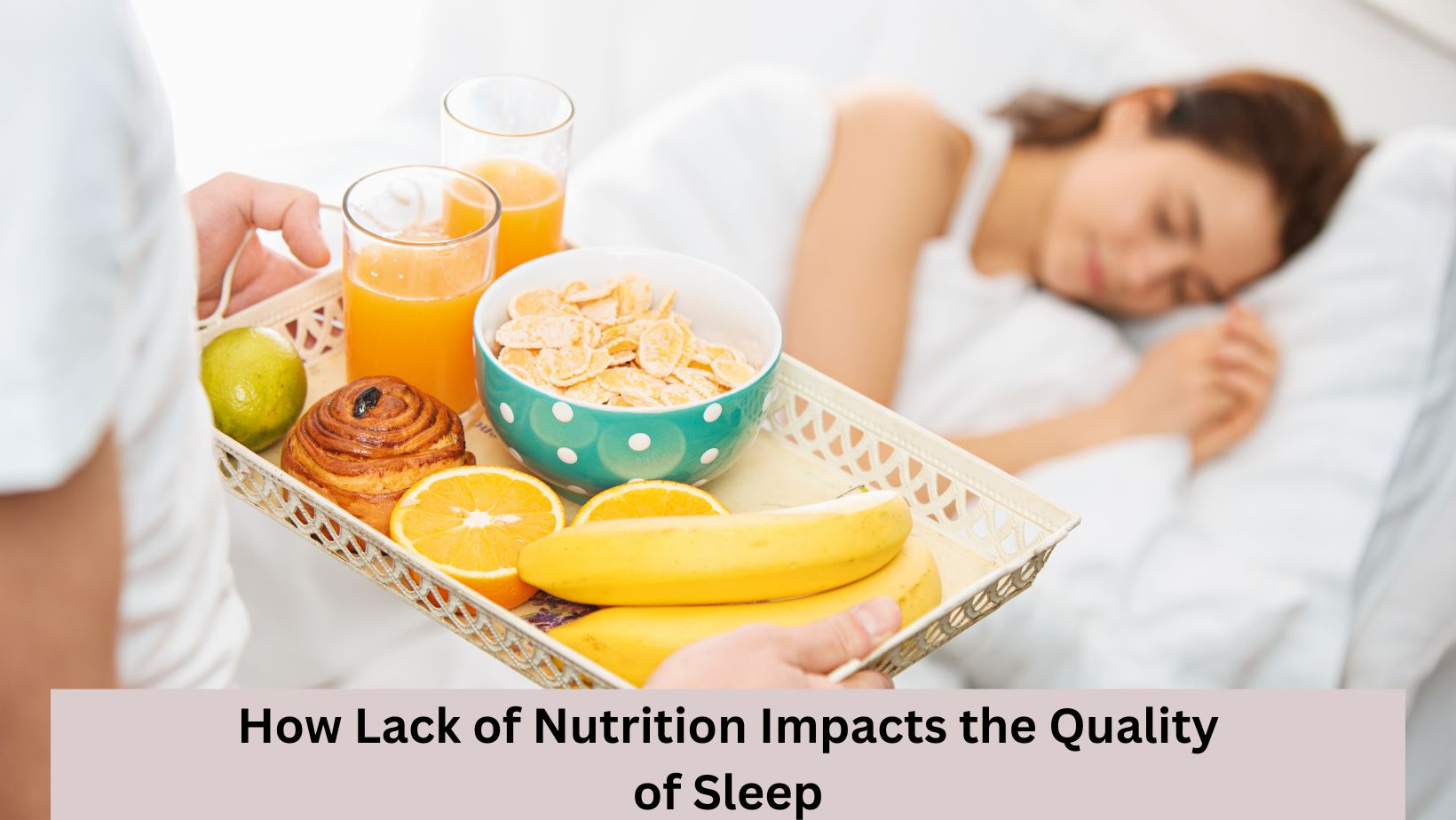
How Lack Of Nutrition Impacts The Quality Of Sleep
Sleep and nutrition are two pillars of health that are deeply interconnected. While most people understand the importance of sleep and nutrition independently, fewer recognize how what we eat—or don’t eat—can have a significant impact on the quality of our sleep. Inadequate nutrition doesn’t just affect our energy levels or immune function; it can also disrupt our sleep patterns, leading to a vicious cycle of poor health. This blog delves into how lack of proper nutrition can impact the quality of your sleep, and why ensuring a balanced diet is crucial for restful, restorative sleep.
The Relationship between Nutrition and Sleep
Our bodies need a variety of nutrients to function properly, including vitamins, minerals, proteins, fats, and carbohydrates. These nutrients support numerous bodily processes, including those that regulate sleep. For example, the neurotransmitters that help to induce and maintain sleep, such as serotonin and melatonin, are directly influenced by the nutrients we consume. Without the right balance of these nutrients, the body struggles to produce and regulate these chemicals, leading to poor sleep quality.
Key Nutrients That Affect Sleep Quality
- Magnesium
Magnesium is a mineral that plays a crucial role in the body’s ability to relax and sleep. It helps regulate neurotransmitters and the hormone melatonin, which guides sleep-wake cycles. A deficiency in magnesium can lead to difficulties in falling and staying asleep, and some studies suggest that magnesium supplementation can improve sleep quality, particularly in people with insomnia.
2. Calcium
Calcium is essential for the production of melatonin, the sleep-inducing hormone. A lack of calcium can result in disturbed sleep, particularly during the REM (Rapid Eye Movement) phase, which is crucial for cognitive functions and mood regulation. Dairy products, leafy greens, and fortified foods are good sources of calcium.
3. Vitamin D
Vitamin D is known for its role in bone health, but it also plays a significant role in sleep regulation. Low levels of vitamin D have been linked to sleep disorders, including shorter sleep duration and poorer sleep quality. Sunlight exposure and foods like fatty fish, egg yolks, and fortified foods can help maintain adequate vitamin D levels.
4. B Vitamins (B6, B12, and Folate)
B vitamins are involved in the production of neurotransmitters like serotonin, which is converted to melatonin in the brain. B12, in particular, helps regulate sleep-wake cycles. A deficiency in B vitamins can lead to insomnia and disrupted sleep patterns. Foods rich in B vitamins include whole grains, meat, eggs, and legumes.
5. Tryptophan
Tryptophan is an amino acid that serves as a precursor to serotonin. High levels of serotonin promote relaxation and help you fall asleep. Tryptophan-rich foods like turkey, nuts, seeds, and bananas can help improve sleep quality by boosting serotonin levels.
Effects of Poor Nutrition on Sleep
- Increased Insomnia Risk
A diet lacking in essential nutrients increases the risk of insomnia. Without the necessary building blocks for neurotransmitters like serotonin and melatonin, the body cannot regulate the sleep-wake cycle effectively. This can lead to difficulty falling asleep, staying asleep, or waking up too early.
2. Disrupted Sleep Patterns
Nutritional deficiencies can disrupt normal sleep patterns, causing fragmented sleep or a decrease in overall sleep quality. This can result in more frequent awakenings during the night and less time spent in the deep, restorative stages of sleep.
3. Increased Stress and Anxiety
Poor nutrition can lead to increased levels of stress and anxiety, which are significant contributors to sleep disturbances. For example, deficiencies in magnesium and B vitamins are known to exacerbate stress and anxiety, making it harder to relax and fall asleep.
4. Weight Gain and Sleep Apnea
A lack of proper nutrition often leads to weight gain, particularly if the diet is high in sugar and refined carbohydrates. Obesity is a major risk factor for sleep apnea, a condition characterized by repeated interruptions in breathing during sleep. Sleep apnea severely disrupts sleep quality and can lead to chronic sleep deprivation.
5. Blood Sugar Imbalance
Consuming too many simple carbohydrates and sugars can cause spikes and crashes in blood sugar levels, which can affect sleep. A drop in blood sugar during the night can cause waking and difficulty returning to sleep. On the other hand, a balanced diet that includes complex carbohydrates, proteins, and healthy fats can help stabilize blood sugar and promote better sleep.
Tips for Improving Sleep Through Nutrition
1. Eat a Balanced Diet
Ensure your diet includes a variety of foods rich in essential nutrients like magnesium, calcium, B vitamins, and tryptophan. Focus on whole foods like fruits, vegetables, lean proteins, and whole grains.
2. Avoid Heavy Meals Before Bed
Eating large or heavy meals close to bedtime can cause discomfort and interfere with your ability to fall asleep. Aim to finish your last meal at least 2-3 hours before bed.
3. Limit Caffeine and Sugar
Reduce your intake of caffeine and sugary foods, especially in the afternoon and evening, as they can disrupt sleep by increasing alertness and causing blood sugar spikes.
4. Consider Supplements
If you’re unable to get sufficient nutrients from your diet alone, consider taking supplements, particularly for magnesium, vitamin D, and B vitamins, after consulting with a healthcare provider.
Conclusion
The connection between nutrition and sleep is undeniable. Ensuring that you consume a balanced diet rich in essential nutrients can significantly improve your sleep quality, leading to better overall health and well-being. By paying attention to what you eat, you can create a foundation for restful, restorative sleep that will help you feel energized and alert during the day. Remember, good sleep starts with good nutrition.
